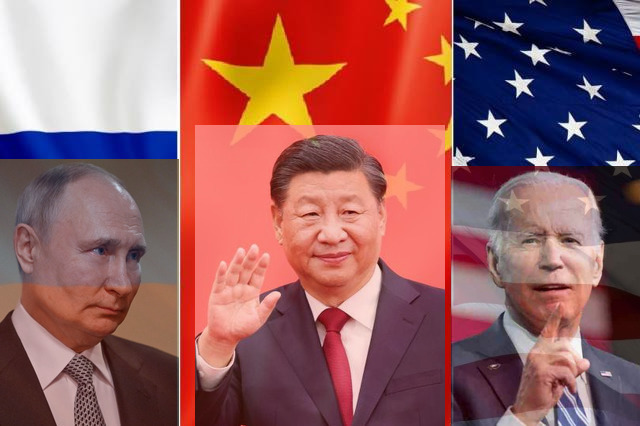Among the many qualities that a nation’s top spy must necessarily have will be his self-effacing nature marked by rare appearances in the media or any public forum. But when he does, it is with the full backing of the administration. The intelligence chief is privy to kind of information that becomes important inputs for framing the country’s foreign and strategic policies.
The other day when William Burns, director of the US Central Intelligence Agency, spoke at length on the corrosive impact of Ukrainian war on the Putin regime and the CIA resolve to not let “it go to waste… a once-in-a-generation opportunity,” the world got an insight into US assessment of how continuance of the war, described as a “Putin fixation on controlling Ukraine and its choices,” will weaken Russian leadership.
Burns said in the course of a lecture in London “disaffection with the war will continue to gnaw away at Russian leadership, beneath the steady diet of state propaganda and practised repression.” The war has in more than one way to Putin’s discomfiture shown the world clumsiness in Moscow’s military strategy and its execution. For the majority of Europeans, the Russian misstep in Ukraine has exposed them to war for the first time in their mainland. The war is a reminder of dangers of not seeing in time aggressive designs of a country like Russia and making wide ranging partnerships. In a telling jibe Burns said the “strategic failure” of Moscow has already consigned it as a “junior partner and economic colony of China being shaped by Putin’s mistakes.”
The West never tires of complaining that through economic coercion to be seen largely in Africa and in some countries in Asia, China is rapidly expanding its area of influence. But it has to be said to the credit of Beijing that it has been immensely successful in mopping up all kinds of resources in Africa from iron ore to bauxite to coal to cobalt in pursuit of long-term raw materials security of its giant metal industries. African countries such as Guinea, a West African least developed nation boasting of the world’s largest and best quality bauxite, Democratic Republic of Congo which has enviably rich cobalt and copper deposits and Zimbabwe, Namibia and Mali where Chinese companies have invested around $4.5 billion in the past two years to acquire lithium mines have over the past many years become the playfield of the world’s second largest economy. Thanks to its aggressive mines acquisition in Africa, China is on its way to secure one-third of the world’s lithium mining capacity by 2025.
But it must be said at the same time, Chinese investors have not given a fair deal to people who had to vacate land for mines development by way of monetary compensation or honouring promises for jobs. Moreover, miners are accused of degrading environment, including harming the quality of water of rivers and streams. The contract concessions that Chinese companies have secured are typically opaque and tilted heavily in their favour. Beijing has now come under pressure from some African countries for a review of contracts that are heavily tilted in favour of China or where promised investments in infrastructure development have not materialised while it continues to ship out millions of tonnes of minerals. This recently led DRC President Felix Tshisekedi to travel to Beijing and meet with President Xi Jinping for renegotiation of a lopsided $6 billion infrastructure for minerals contract. Furthermore, Chinese miners are not found to be as committed to environment mitigation and worker safety and financial compensation as their counterparts in developed countries.
ALSO READ: Ukraine – A Dangerous War Rehearsal
No doubt, when African countries were in desperate need for funds China made that available for infrastructure and overall economic development. But many in the West see in the ever growing presence of China in Africa, particularly in resources sector a new kind of colonialism perpetrated in league with military juntas and autocrats. The Chinese economic aggression in China and elsewhere, particularly under the template Belt and Road Initiative (BRI) has seen government agencies and private enterprises working in tandem.
At the same time, nearly a decade after its launch Xi Jinping’s ‘project of the century’ BRI looks slowing as lending slums and quite a few projects stall. Ahead of BRI sputtering, caused by the Covid pandemic and China’s own economic slowdown, China invested billions of dollars in its ambitious economic and political engagement with a host of countries. Through BRI Beijing is attempting to reach out to more than 140 countries.
The focus of the initiative is infrastructure development and at the same time export China’s industrial overcapacity to targeted countries. BRI launched in 2013 with great fanfare looks more ambitious than Marshall Plan. Not only the West but India and Japan too have reservations of China’s multinational and multi-modal infrastructure connectivity drive.
S Jaishankar, foreign minister of India, says: “Connectivity projects should respect the sovereignty and territorial integrity of member states and respect international law.” In any case, India once again made its position clear on BRI at the recently held meeting of the Shanghai Cooperation Organisation (SCO) when it refused to sign on the paragraph supporting XI Jinping’s much hyped project. The world will be watching how China will be infusing life in BRI, marked so far by predatory lending leaving loan receiving countries in debt traps, poor risk management and slippages in project execution.
Infusing life in BRI will be a major challenge since many aid receiving countries remain wary of Chinese designs. While the West and others will watch the progress of BRI with concern, there is major disappointment that Beijing is hardly doing anything to bring Vladimir Putin to senses to end the Ukrainian war. Nobody is counting Putin out yet but the Wagner mutiny has exposed the Russian tyrant’s growing weaknesses. China could have used the occasion to pull back Putin from heaving further miseries on Ukrainians. But that was not to be to the disappointment of the West, which is supporting Kyiv in its effort to repulse Russian aggression and in the world in general hoping for end of war.
All this and the growing support of their own people to pursue policies that will protect the interest of the US and its allies have emboldened President Biden, UK prime minister Rishi Sunak and other Western leaders to say emphatically that they are not to countenance aggressive political and economic designs of China primarily and also of the now much weakened Russia.
Biden recently said: “We seek competition, not conflict. Our economic policies are aimed at investing in American industry and technologies of the future, the same ones that Beijing is intent on dominating.” The US is favouring increasing trade restrictions on some high-tech equipment in order to ensure advanced technologies are not used against it and its allies. Not the US alone, the majority of NATO members are highly risk-averse around sharing high-technologies with China or participate with it in research collaboration in their development.
A public opinion polling in the UK by Freshwater Strategy shows that 68 per cent of British voters do not want Chinese participation in research on cyber security software and for DNA testing 51 per cent feel the same. At the same time, the US is considering banning US foreign direct investment in China where sensitive technologies are involved. It will not come as a surprise if the popular Chinese short video app TikTok gets banned in the US, which prioritizes security concerns over economic costs.
To all this the Chinese reaction runs like this: The American insensitivity and animus stem from its insecurity over China’s impressive rise as an economic power and with it political clout. The US and its allies are busy undermining China’s progress by doing “all-round containment, encirclement and suppression of China,” thinks Beijing. President Biden famous for his flip-flops said: “We seek competition, not conflict. Our economic policies are aimed at investing in American industry and technologies of the future, the same ones that Beijing is intent on dominating.” In recent times the US is putting increasing trade restrictions on many high-tech equipment so that China cannot use advanced technologies against America. But Taiwan, a self-ruled island off the coast of eastern China, could ever remain a flashpoint in Sino-American relations. Remember in September last when President Biden was asked if the US would come to defend Taiwan in case of China attack, he said: “Yes, if, in fact, there was an unprecedented attack.”
This, however, was not in consonance with the US official policy prompting Washington to clarify that it was not committed to military action on Taiwan. Beijing claims Taiwan as part of its territory and to underpin that it would conduct substantial military exercises around the self-governing island. Like the large-scale military drill that occurred in April, including the simulated sealing off the island in protest against the Taiwanese President’s US trip. Hopefully, China will stop at sabre-rattling and not make actual annexation attempt. Perhaps that explains the US strategic ambiguity not committing to defend Taiwan, but also not ruling out the option.
Read More: https://lokmarg.com/


